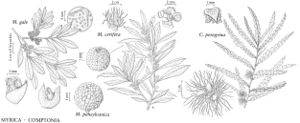Difference between revisions of "Comptonia peregrina"
Mem. Torrey Bot. Club 5: 127. 1894.
FNA>Volume Importer |
FNA>Volume Importer |
||
| Line 48: | Line 48: | ||
}}<!-- | }}<!-- | ||
| − | --><span class="statement" id="st- | + | --><span class="statement" id="st-undefined" data-properties=""><b>Shrubs,</b> to 1.5 m, forming rhizomatous colonies. <b>Branchlets</b> red-brown to gray, pilose to villose, sometimes puberulent. <b>Leaves</b>: stipules nearly cordate, long-acuminate. <b>Leaf</b> blade very aromatic when crushed, 3-15.5 × 0.3-2.9 cm, lobes alternate to nearly opposite, base truncate, cuneate to attenuate, or oblique, apex acute; surfaces abaxially pale gray-green, densely pilose to puberulent, adaxially dark green, densely pilose to glabrate, gland-dotted, especially adaxially. <b>Inflorescences</b>: staminate in clusters at ends of branches, elongating to 5 cm, bracts broadly ovate to trullate, margins ciliate, apex acute to long-acuminate, abaxially gland-dotted; pistillate to 5 mm at anthesis, elongating in fruit to 2 cm, bracteoles to 1.3 cm, pilose, gland-dotted. <b>Fruits</b> 2.5-5.5 mm.</span><!-- |
-->{{Treatment/Body | -->{{Treatment/Body | ||
| Line 80: | Line 80: | ||
|publication year=1894 | |publication year=1894 | ||
|special status=Endemic;Selected by author to be illustrated;Weedy | |special status=Endemic;Selected by author to be illustrated;Weedy | ||
| − | |source xml=https://jpend@bitbucket.org/aafc-mbb/fna- | + | |source xml=https://jpend@bitbucket.org/aafc-mbb/fna-data-curation.git/src/9216fc802291cd3df363fd52122300479582ede7/coarse_grained_fna_xml/V3/V3_570.xml |
|genus=Comptonia | |genus=Comptonia | ||
|species=Comptonia peregrina | |species=Comptonia peregrina | ||
| − | |||
| − | |||
| − | |||
| − | |||
| − | |||
| − | |||
| − | |||
| − | |||
| − | |||
| − | |||
| − | |||
| − | |||
| − | |||
| − | |||
| − | |||
| − | |||
| − | |||
| − | |||
| − | |||
| − | |||
| − | |||
| − | |||
| − | |||
}}<!-- | }}<!-- | ||
-->[[Category:Treatment]][[Category:Comptonia]] | -->[[Category:Treatment]][[Category:Comptonia]] | ||
Revision as of 14:44, 27 July 2019
Shrubs, to 1.5 m, forming rhizomatous colonies. Branchlets red-brown to gray, pilose to villose, sometimes puberulent. Leaves: stipules nearly cordate, long-acuminate. Leaf blade very aromatic when crushed, 3-15.5 × 0.3-2.9 cm, lobes alternate to nearly opposite, base truncate, cuneate to attenuate, or oblique, apex acute; surfaces abaxially pale gray-green, densely pilose to puberulent, adaxially dark green, densely pilose to glabrate, gland-dotted, especially adaxially. Inflorescences: staminate in clusters at ends of branches, elongating to 5 cm, bracts broadly ovate to trullate, margins ciliate, apex acute to long-acuminate, abaxially gland-dotted; pistillate to 5 mm at anthesis, elongating in fruit to 2 cm, bracteoles to 1.3 cm, pilose, gland-dotted. Fruits 2.5-5.5 mm.
Phenology: Flowering spring, fruiting summer.
Habitat: Dry, sterile, sandy to rocky soils in pinelands or pine barrens, clearings, or edges of woodlots
Elevation: 0-1800 m
Distribution

N.B., N.S., Ont., P.E.I., Que., Conn., Del., Ga., Ill., Ind., Ky., Maine, Md., Mass., Mich., Minn., N.H., N.J., N.Y., N.C., Ohio, Pa., R.I., S.C., Vt., Va., W.Va., Wis.
Discussion
Comptonia peregrina has been reported from Tennessee (Scott County), but I have not seen any specimens.
Many Native American tribes used different parts of Comptonia peregrina variously: as an incense for ritual ceremonies; for medicinal purposes; as a stimulant or tonic; as a food seasoning; and as a poison (D. A. Moerman 1986).
Selected References
None.
